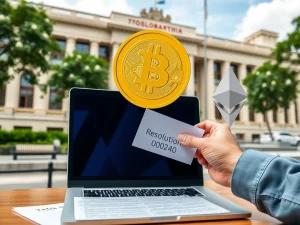Urgent Warning: Trump Tariffs Fuel Bitcoin’s Rise Against Fragile US Dollar

Is the unthinkable becoming reality? The specter of Donald Trump’s tariffs is not just shaking global markets; it’s reigniting a powerful narrative: Bitcoin’s potential to not just coexist with, but potentially outlast the US dollar. What was once dismissed as crypto-enthusiast hyperbole is now entering the mainstream conversation, fueled by growing anxieties over traditional finance and the perceived fragility of fiat currencies. Are we witnessing the dawn of a new financial order where digital assets like Bitcoin become the ultimate safe haven?
Trump Tariffs: Igniting Bitcoin’s Challenge to the US Dollar
President Trump’s recent implementation of sweeping global tariffs has sent ripples of uncertainty through global markets. While some initially anticipated a strengthening of the US dollar, the reality has been quite different. As highlighted in a Wall Street Journal report, these tariffs are not bolstering the dollar as expected. Instead, they are contributing to broader economic anxieties, making investors rethink their strategies and prompting a search for alternative assets. This is where Bitcoin, the pioneering cryptocurrency, is increasingly stepping into the spotlight.
Jeff Parks, Head of Alpha Strategies at Bitwise Invest, articulated this sentiment powerfully in an X post, stating, “Higher chance Bitcoin survives over the dollar in our lifetime after today.” This isn’t just casual speculation; it’s a serious consideration from a seasoned market analyst. The core issue, as Parks and Bitwise CEO Hunter Horsley suggest, is a growing erosion of trust in the US dollar and traditional financial systems. With other fiat currencies also perceived as weak, the options for investors seeking stability are narrowing.
Is Bitcoin a Superior Store of Value in Times of Economic Uncertainty?
Gold has historically been the go-to safe haven asset during times of economic turmoil. However, Horsley points out the practical limitations of gold in the modern digital age – the complexities and costs associated with shipping and secure storage. In contrast, Bitcoin offers a digital, borderless, and easily storable alternative. This inherent advantage is becoming increasingly attractive as global economic uncertainty mounts.
Michael Saylor, a prominent Bitcoin advocate, is also cited in the original article, implicitly reinforcing the narrative of Bitcoin as a viable alternative amidst dollar weakness. The US Dollar Index, a measure of the dollar’s strength against other major currencies, is down nearly 6% since the start of the year, indicating a weakening trend. This backdrop further strengthens the argument for exploring alternative stores of value like Bitcoin.
Fiat Money Concerns and the Allure of Bitcoin
Saifedean Ammous, a Bitcoin author, brings a crucial perspective to the discussion. He argues that the fundamental problem isn’t just trade deficits with specific countries, but the systemic issue of “fiat money printers.” Ammous points out that the ability of the US to continuously print money relies on global dollar usage. However, this system is inherently fragile and unsustainable in the long run. His proposed solution is a shift away from “fake money” towards a “hard store of value,” explicitly mentioning Bitcoin and gold.
Ammous’s argument boils down to a critical choice for the global economy: continue with a system of inflationary fiat currencies, or transition to a more sound monetary standard. He provocatively suggests that the world should stop using America’s “shitcoin” and embrace a hard money alternative to address the underlying economic imbalances. This bold statement underscores the growing disillusionment with traditional fiat systems and the increasing appeal of decentralized, finite-supply assets like Bitcoin.
Navigating the Economic Storm: Why Bitcoin is Gaining Traction
Let’s break down why the current economic climate, exacerbated by Trump’s tariffs, is creating a perfect storm for Bitcoin adoption:
- Erosion of Trust in Fiat: Government interventions, inflationary pressures, and economic uncertainties are eroding confidence in traditional fiat currencies.
- Geopolitical Instability: Trade wars and global tensions further fuel the need for assets independent of national economies.
- Bitcoin’s Decentralization: Bitcoin’s decentralized nature makes it resistant to political and economic manipulation, a key advantage in uncertain times.
- Limited Supply: Bitcoin’s capped supply of 21 million coins offers a hedge against inflation, unlike fiat currencies which can be printed indefinitely.
- Digital Accessibility: Bitcoin’s digital nature makes it easily transferable and storable across borders, overcoming the logistical challenges of traditional safe havens like gold.
Could Bitcoin Really Replace the US Dollar?
While the idea of Bitcoin completely replacing the US dollar might seem far-fetched to some, the current economic trajectory is forcing even traditional financial analysts to consider this possibility. The question isn’t necessarily about complete replacement in the immediate future, but rather about Bitcoin establishing itself as a significant, parallel financial system – a credible alternative for individuals, institutions, and even nations seeking refuge from fiat currency volatility and inflation.
The path ahead is undoubtedly complex and fraught with challenges. Regulatory hurdles, technological scalability, and mainstream adoption are all critical factors. However, the narrative shift is undeniable. Bitcoin is no longer just a speculative asset; it’s increasingly being viewed as a potential solution to systemic weaknesses in the global financial order. As economic uncertainties persist and faith in traditional institutions wavers, the compelling proposition of Bitcoin as a decentralized, sound money alternative will only grow stronger. The conversation has shifted from “if” Bitcoin matters to “how much” and “how soon.”
Disclaimer: This article is for informational purposes only and does not constitute financial advice. Investing in cryptocurrencies involves significant risk. Conduct thorough research and consult with a financial advisor before making any investment decisions.










